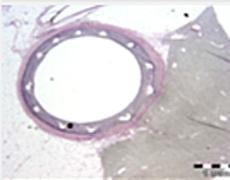
February 21, 2011 – The first patient has been enrolled the DESSOLVE II study to support CE mark for a coronary stent that uses a bioresorbable drug polymer. The MiStent drug-eluting coronary stent system (MiStent DES), by Micell Technologies.
The trial involves treatment of patients with de novo lesions in the native coronary arteries. Stefan Verheye, M.D., Ph.D. at Middelheim Hospital, Antwerp, Belgium enrolled the first patient in the study.
The MiStent DES employs supercritical fluid technology, which applies a precisely controlled absorbable polymer - active drug (sirolimus) matrix onto a cobalt-chromium stent. The polymer dissolves and releases the drug into the surrounding tissue in a controlled manner, designed to optimize dosing of the drug throughout the affected artery. In preclinical trials, the drug completely elutes and the polymer is eliminated from the stent within 45 to 60 days in-vivo, resulting in a bare-metal stent.
DESSOLVE II is a prospective, controlled, 2:1 unbalanced randomized, multicenter study of approximately 270 patients. Patients will be enrolled at 26 clinical sites in Europe, New Zealand and Australia. Candidates for the trial are patients with documented stable or unstable angina pectoris or ischemia. The primary endpoint is superiority of MiStent DES in minimizing in-stent late lumen loss at nine months, compared to Medtronic's Endeavor DES, as measured with angiography in treated de-novo lesions ranging in diameter from 2.5 to 3.5 mm and amenable to treatment with a maximum 23 mm long stent.
Along with secondary clinical endpoints such as major adverse cardiac events and revascularization rates, the extent of stent coverage and re-endothelialization, via optical coherence tomography (OCT), and endothelial function (vasomotor response) will be evaluated in a subgroup of patients at nine months.
"Drug-eluting stents have significantly improved and expanded our ability to treat coronary atherosclerotic lesions compared to bare-metal stents," said William Wijns, M.D., Cardiovascular Center, Aalst, Belgium, and principal investigator of the study. "However, cardiologists are still looking for options to improve safety and outcomes. The MiStent DES may address some of these issues directly. Based on recent GLP animal data, the polymer and drug are gone from the stent within 45 to 60 days. This may reduce the risk of late-stent thrombosis related to long-term exposure to DES nonerodible polymers. Given the relatively short residence time of polymer on the stent, MiStent DES may allow for a shorter duration of dual antiplatelet therapy and be a safer choice for noncompliant patients. These performance-enhancing properties are what interventional cardiologists are looking for in a new drug-eluting stent."
For more information: www.micell.com


 January 05, 2026
January 05, 2026 









